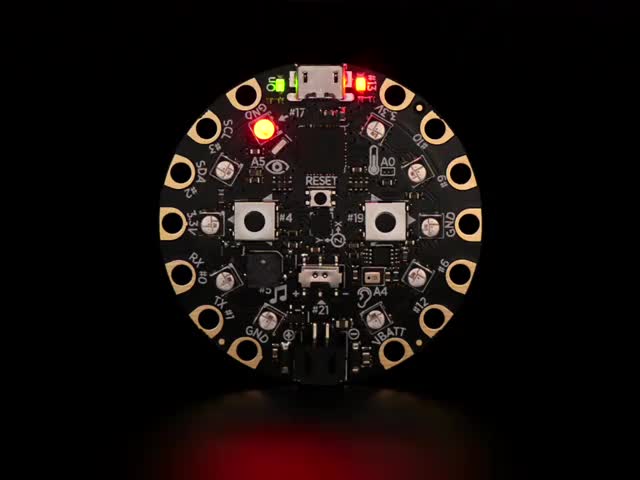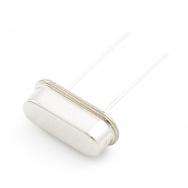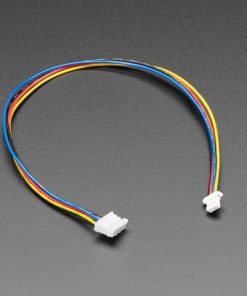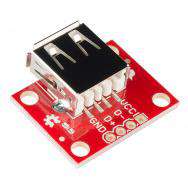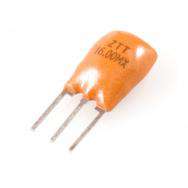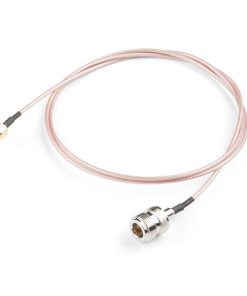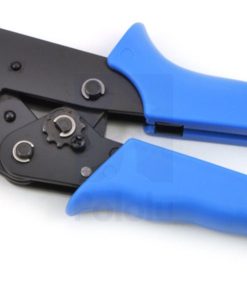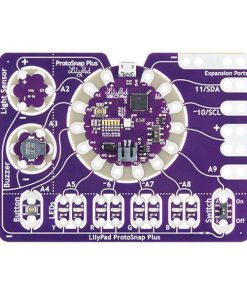Circuit Playground Classic Adafruit
$ 34,95 $ 20,97
Would you like to learn electronics, with an all-in-one board that has sensors and LEDs built-in? Circuit Playground is here – and it’s the best way to practice programming on real hardware with no soldering or sewing required!
This is the Classic version of Circuit Playground, which comes with an ATmega32u4. It’s designed to be used with Arduino IDE and code CS Discoveries only. It even comes with Firmata already programmed in, so you can use it immediately with code Discoveries without any preparation or updates.
If you would like to use MakeCode or CircuitPython, check out Circuit Playground Express, which can be used with MakeCode, CircuitPython or Arduino.
Circuit Playground features an ATmega32u4 processor, just like our popular Flora. The board’s also round and has alligator-clip pads around it so you don’t have to solder or sew to make it work. You can power it from USB, a AAA battery pack, or with a Lipoly battery (for advanced users). Just program your code into the board then take it on the go!
- ATmega32u4 Processor, running at 3.3V and 8MHz
- MicroUSB port for programming and debugging with Arduino IDE
- USB port can act like serial port, keyboard, mouse, joystick or MIDI
Circuit Playground has built-in USB support. Built-in USB means you plug it in to program it and it just shows up. All you really need is a Micro-B data/sync USB cable – not included! With the new 1.6.4+ Arduino IDE, it takes only a few seconds to add support. The Circuit Playground has USB HID support, so it can act like a mouse or keyboard and attach directly to computers.
Here are some of the great goodies baked in:
- 10 x mini NeoPixels, each one can display any colour
- 1 x Motion sensor (LIS3DH triple-axis accelerometer with tap detection, free-fall detection)
- 1 x Temperature sensor (thermistor)
- 1 x Light sensor (phototransistor)
- 1 x Sound sensor (MEMS microphone)
- 1 x Mini speaker (magnetic buzzer)
- 2 x Push buttons, left and right
- 1 x Slide switch
- 8 x alligator-clip friendly input/output pins
Includes I2C, UART, and 4 pins that can do analogue inputs/PWM output - All 8 pads can act as capacitive touch inputs
- Green “ON” LED so you know its powered
- Red “#13” LED for basic blinking
- Reset button
Check out our detailed tutorial for pinouts, driver installation, Arduino IDE, and more!
Professional packing and fast shipping
Our long-standing partnership with UPS FedEx DHL and other global carriers gives us the ability to provide a range of shipping services. Our warehouse staff is highly educated and will package the items according to the exact and precise specifications. Before shipment, all items are thoroughly inspected and secured. We ship to thousands clients every day from all over the world. The fact that we are dedicated to becoming the largest online retailer in the world is clear. We have distribution centers as well as warehouses located in Europe and the USA.
Note: Orders that contain multiple items will have a different processing time for each item.
Prior to shipment, we inspect the ordered items thoroughly. The majority of orders are shipped within 48 hrs. The delivery time should be between 3-7 working days.
Returns
The stock is dynamic and we do not completely manage it because many stakeholders are involved, including our warehouse and factory. Stocks are subject to change at any time. Be aware that it is possible that your order will be out of stock after you have placed the order.
Our policy is valid for a period of 30 days. We are unable to exchange or refund your order when it's been 30 days since you purchased it.
You can only return a product in the event that it is not used and still in the same condition when you first received it. You must have the item in the original packaging.
Related products
Electronic Components
Cables and Connectors
4-pin JST PH to JST SH Cable – STEMMA to QT / Qwiic Adafruit
Cables and Connectors
Electronic Components
E-Textiles
Uncategorized
Batteries/Power
Cables and Connectors
XBee Boards
E-Textiles
Voltage Regulators
